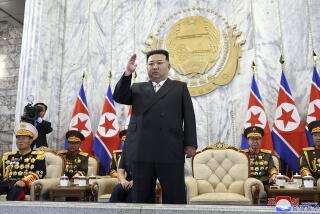Two Koreas Mark 60 Years Since End of Japanese Rule
- Share via
SEOUL — North and South Koreans on Sunday began a mutual celebration of the 60th anniversary of independence from Japanese colonial rule amid calls for unification despite an unresolved crisis over the communist nation’s nuclear plans.
The four-day event highlights renewed exchanges between the two Koreas and comes during a recess in six-country talks aimed at ending North Korea’s nuclear weapons ambitions.
Two North Korean passenger jets flew from the North’s capital, Pyongyang, to Inchon in the South, near Seoul, on Sunday carrying 182 delegates led by senior Communist Party official Kim Ki Nam.
After an unprecedented visit to the South’s National Cemetery to pay respects to soldiers killed in the Korean War, the North Korean delegates joined South Koreans at the opening ceremony, which played to the people’s apparent desire for unification.
“We must overcome regional and partisan interests to join the will and strength of the nation,” Kim told the crowd.
South Korean Unification Minister Chung Dong Young welcomed the North Koreans’ visit to the national memorial, saying it would help usher in “a new future of national harmony.”
“We must set aside our painful past and reconcile, help each other and join hands to walk toward the mutual prosperity of the nation,” he said.
Ahead of the opening, about 30 North Koreans, including delegation head Kim, visited Seoul’s National Cemetery.
The burial ground houses Korean War dead and fighters who died resisting Japan’s brutal 1910-1945 colonization of the peninsula, Unification Ministry spokeswoman Yang Jeong Hwa said.
“We’ve proposed the visit to remember the many who died for Korea’s liberation,” Kim told Chung in a meeting at a Seoul hotel, according to pooled news reports.
The North Koreans paid respects in silence at the cemetery for about five minutes.
South and North Korea are technically still at war under a truce that ended the 1950-53 Korean War and left the Korean peninsula divided. Relations warmed rapidly after an unprecedented and unrepeated summit of the two Korean leaders in 2000. The impoverished North has increasingly depended on the South for food and commercial aid.
But a crisis spurred by Pyongyang’s nuclear ambitions remains unresolved after four rounds of talks to end the North’s nuclear weapons programs in return for aid and security guarantees.
South Korean Foreign Minister Ban Ki Moon has said Seoul planned to hold discussions with visiting officials to help negotiate an agreement when the talks resume.
South and North Korea, the United States, Japan, Russia and China broke off talks in Beijing on Aug. 7 after 15 days. They will reconvene negotiations the week of Aug. 29 in the Chinese capital.
Pyongyang’s top negotiator, Vice Foreign Minister Kim Gye Gwan, said the North was willing to prove it did not have a uranium-based nuclear weapons program, as Washington says.
“We don’t have any uranium-based weapons program, but in the future if there is any kind of evidence that needs to be clarified we will be fully prepared to do so,” a CNN report quoted Kim as saying in Pyongyang.
The existence of a uranium program and the North’s insistence on the right to a civilian nuclear power program have been the most contentious issues at the six-party talks.
The North’s No. 2 leader, Kim Yong Nam, said Pyongyang was committed to the multinational discussions but was prepared to “smash the moves of the enemies” -- referring to the U.S. -- “to isolate and stifle” North Korea.
More to Read
Sign up for Essential California
The most important California stories and recommendations in your inbox every morning.
You may occasionally receive promotional content from the Los Angeles Times.










